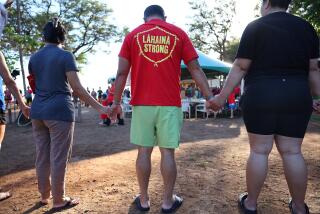Tensions Between Virgin Islanders, Mainland ‘Continentals’ Simmer
- Share via
CHARLOTTE AMALIE, Virgin Islands — Ill will is brewing between the natives of this U.S. territory and the “continentals” from the U.S. mainland who visit as tourists or live here.
The main issue is economics: Virgin Islanders, who largely are black, believe that they are excluded from the top jobs in the hotels and businesses, which for the most part are owned by whites.
Also, as tourism has produced not only economic growth but soaring land values, a population boom, crowded beaches, clogged streets and an uneasy mingling of affluence and poverty, questions are being raised about the pace and direction of development.
‘Soul Lost to Tourism’
Marilyn Krigger, a professor of history at the University of the Virgin Islands, said past governments have devoted too much attention to promoting tourism, resulting in “change so overwhelming that it destroys the character of a place. Our soul--our culture, our young people--is being lost to tourism.”
That feeling is depicted in a 100-foot wall painting showing the territory’s past and present. The past shows a peasant at water’s edge, watching a sunset. The present shows a bulldozer approaching an islander sitting warily by a sign that says, “Condo Swimmers Only.”
“That symbolizes the changes here in the Virgin Islands,” said artist Austin Petersen who helped paint it. “It represents things that make us Virgin Islanders and which are being taken away from us.”
Felt Singled Out
The frustrations of native Virgin Islanders can be seen in their dark glances, muttered comments, and the derisive sound of air sucked in between clenched teeth.
At the end of the recent Carnival, about 100 black youths assaulted people whose cars were stopped in a line behind a calypso band.
Victims said they believed they were singled out because they were white or East Indian.
Government officials play down racial implications of the incident. Gov. Alexander Farrelly, a black, said in an interview that rowdy behavior is only to be expected at Carnival. He noted that black people also were injured during the annual festival.
Nevertheless, Farrelly acknowledged that societal tensions on the three main islands of the territory--St. Thomas, St. Croix and St. John--seem to be increasing, and that there is a racial undercurrent.
‘More Aggression Now’
“More people and more unemployment leads to exasperation, impatience and, yes, occasionally, some violence,” said Farrelly, who is 62 and a native Virgin Islander. “There is more aggression now. Racially, it’s more tense now than 10 years ago, than five years ago.”
The 110,000 or so residents are U.S. citizens with all the rights and obligations except, as is the case with Puerto Ricans, they cannot vote for President and their representative in Congress is a non-voting delegate.
Ethnically, about 65% of native islanders are of African descent, 25% came from neighboring islands and Puerto Rico, and the rest are white.
Economic development was spotty until the advent of commercial air travel in the 1950s, and the tourism boom that began in the 1960s. About 1.3 million people a year, most of them whites from the U.S. mainland, now visit the territory. Tourism accounts for about one-third of the jobs and gross output of the three main islands.
Tourism Is the Key
“Tourism is the wheel that drives our public services,” Farrelly said. “A lot of our young people don’t understand the relationship between the dollars generated by tourism and the number of police--and teachers and nurses--we can hire.
“We need more (tourism) if we want to improve our school system, our Department of Health.”
Even critics acknowledge that there is no ready substitute for tourism as an engine of economic growth.
But critics also claim that tourism doesn’t provide meaningful jobs, that hotel owners and contractors don’t contribute enough to government coffers, and that the clash in values between sophisticated, white, urban tourists and mellow, black, rural islanders eventually may lead to physical confrontation.
Touched a Chord
“If condo development continues for another 20 to 30 years, the population will be mainly white,” Krigger said. “We are a mainly black population. I think that’s something we should be proud of and try to maintain.”
Adelbert Bryan, a police captain, ran for governor in November on the theme of islanders forgotten in their own homeland. Farrelly defeated him by a 2-1 margin by Farrelly, but Bryan’s 35% vote tally, drawn mostly from poorer districts, indicated that he touched a chord among native islanders.
What the territory needs, Bryan said in an interview, is low- and middle-income housing, not $200,000 condos. He added that the government should also increase taxes on hotels and use the revenue to improve schools and public health.
Schools have been on double session for years due to a lack of space, and the government acknowledges that hundreds of teachers are uncertified, in part because the pay is low.
Improvements Needed
The list of public housing applicants far exceeds the government’s construction plans, and among other public tasks is the upgrading of a sewer system that one official described as “primitive.”
Farrelly said improving public education is his top priority, and then economic development. To spur the latter, he advocates joint ownership between mainland investors and native entrepreneurs.
More to Read
Sign up for Essential California
The most important California stories and recommendations in your inbox every morning.
You may occasionally receive promotional content from the Los Angeles Times.













